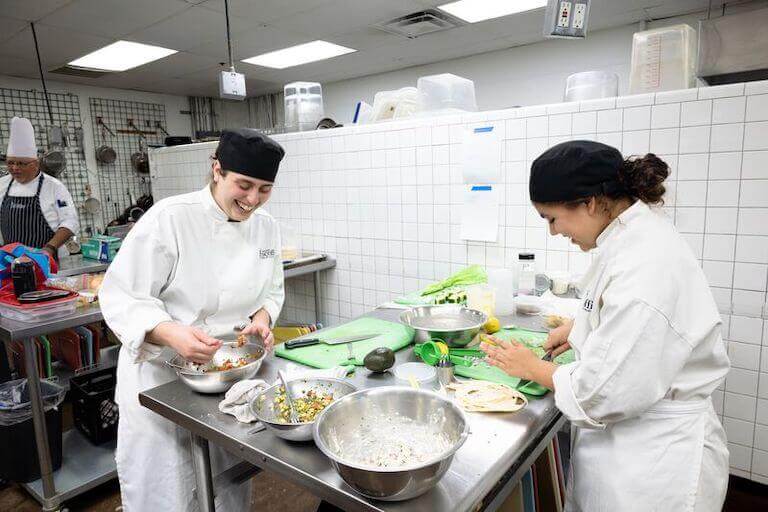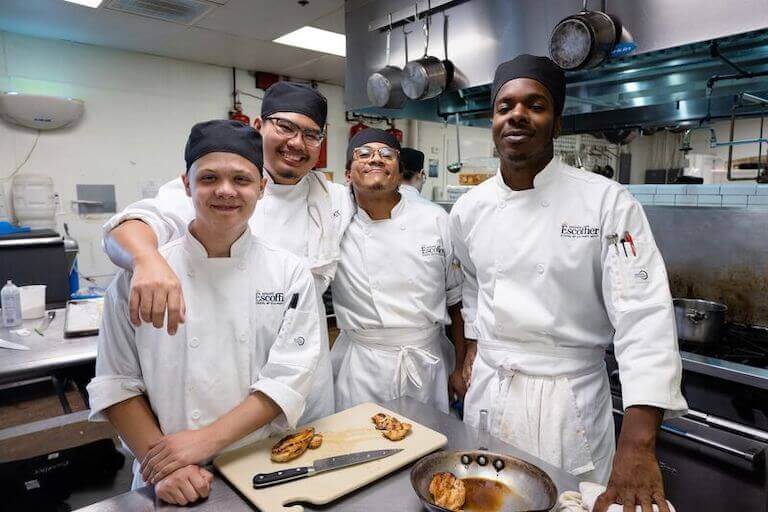Are you navigating the world of culinary school with countless questions of what to expect?
Perhaps you’re juggling a job in the kitchen while pursuing your culinary dreams and are worried about balancing family and a social life. Or maybe you’re trying to work through how to fully utilize the benefits of your culinary education when you’ve received your diploma or degree?
In these moments of uncertainty, it can be easy to feel like you’re all alone. But a benefit of attending culinary school is that many people have been through the same experience you have (or will have) during your program. These peers, more than just classmates, can become mentors and guides on your culinary journey.
The key is recognizing and harnessing these mentorship opportunities, which are scattered throughout your culinary school experience. In the following sections, we’ll explore how you can identify and make the most of peer mentors while you’re in school.
Navigating Culinary School Together

Great peer mentorship involves showing others how things are done instead of simply telling them how to do it.
While you’re taking courses in culinary school, you’re likely to be exposed to peers from diverse backgrounds. Each of your peers potentially has something they can teach you, and this is where peer mentorship becomes so valuable. Not only could you learn important skills for your career, but you can also build relationships with others that can carry on long after graduation.
What is “peer mentorship”?
Peer mentorship is the process through which two or more people striving toward similar goals help each other learn and grow in their practices.
Building a Supportive Community
For many people, attending school of any kind will have its ups and downs. Learning a new skill can be challenging, especially when you’re trying to do it by yourself.
Culinary school students have plentiful resources at their disposal for mentorship. The most obvious resource available is your Chef Instructors, but don’t discount the value of your fellow peers. One of the beauties of cooking is that everyone will bring their own unique tips and tricks to it that they’ve learned along the way.

Peer mentorship can forge long-lasting friendships between classmates and coworkers.
This is where peer mentorship can be so powerful. Connecting with past and present students who are in or have been in similar classes and experiences to you can make your time in school easier. They can give you their own perspective on what to look out for and even how to learn complex concepts.
But peer mentorship is also more than simply teaching others skills; you’re also forging relationships with others and building community! When you’re willing to connect with your peers in this way, everyone stands to benefit.
Finding Your People
There’s no one-size fits all solution when it comes to finding peer mentorship connections that work for you. Just like fostering any kind of relationship, a large part of peer mentoring is finding the right people to help you on your journey.
Whether you’re taking courses in-person or online, a great way of finding the right people to connect with is to identify groups or organizations that intrigue you. They can be based around something you’re familiar with or something you’ve never had a chance to try, like a certain cuisine.
How to Find Potential Mentorship Opportunities
Finding peer mentorship opportunities can be challenging. Here are some tips:
- Social media: We’re all already using social media; consider searching for opportunities and individuals with similar backgrounds to yourself. A great place to start looking is on Linkedin.
- Attend local events: These gatherings provide opportunities to meet like-minded individuals who may be interested in forming mentorship relationships or can introduce you to existing mentorship communities.
- Ask Instructors: In your culinary courses, you have access to incredibly knowledgeable instructors who may be able to point you in the right direction of peer mentorship opportunities.
For instance, The James Beard Foundation has a legacy network where members can connect with industry professionals and peers for mentorship opportunities and career advancement.
Another example is Global Leadership Enhancement & Mentorship Network (GLEAM), which is a nonprofit volunteer organization that has created a network for food industry professionals to connect. A key pillar of their network’s offerings is peer mentorship and connecting with others who are at a similar stage of their career as you or have been there in the past.
If You Build It, They Will Come
While there are tons of organizations and groups that already exist where you may find peer mentorship, sometimes you just want to do your own thing. Another way to find like-minded individuals to learn and grow with on your culinary journey is to build your own community.
By creating your own community, you can tailor experience to be most beneficial to your needs. It also allows you to have the opportunity to mentor others.
For instance, a group of online Escoffier students found creative ways to connect with their peers. A simple way to get started is to follow their example.
They began hosting weekly Zoom meetings with the help of a Chef instructor and used them as study sessions to go over course material and get to know their classmates better. As word spread about these meetings, more people attended and together these peers formed concrete bonds that helped them finish their programs.
When Students Become Mentors
Students have gained knowledge through their experiences that is worth passing on to those coming up behind them.
Sharing the tips, tricks, and shortcomings you have experienced in your life can be a powerful gift to give to others. Peer mentorship has the ability to make the lives of those who came after you a bit easier through learning from your mistakes.
You may be thinking that your schedule is already busy enough (and it might be!) but mentoring others doesn’t have to be a fulltime job. Small gestures like offering to answer a few questions over email or just being there for someone when they are struggling are easy things to do that don’t take up much time and that can mean the world to others.
Learn From The Best, Even After Graduating
In addition to community groups you can make or join, one of the amazing benefits of attending culinary school is that you gain access to a robust alumni network.
Remember that stress you have about what you’ll do after school? Or perhaps, you’re considering changing careers in the culinary industry. Whatever your situation may be, most likely there will be someone who is part of the alumni association who has been in a similar position as you.

Aspiring chefs can learn many important lessons through relationships formed in peer mentorship.
Within the alumni association, you can meet people who have walked in your shoes, taken the same courses, and come out the otherside as successful professionals. They can offer you peer mentorship opportunities in the form of one on one connections, externships, and more.
For graduates of Auguste Escoffier School of Culinary Art, the Auguste Escoffier Alumni Association can be a phenomenal way to find mentorship. In the community, you can indicate whether you’re looking for peer mentorship or wanting to mentor others.
This community is constantly growing as more people complete their programs and enter the field, which can give you a practically endless well of potential connections to make.
Clearing a Path Forward
So what does all of this mean? Participating in peer mentorship, whether you are the mentee or the mentor, can make so much of your own journey clearer.
You have the chance to make friends and potential collaborators through peer mentorship, but by mentoring others you can better understand your own journey and what you want out of your career.
When you are able to connect with others who have walked down a similar path to your own, you can look at their footsteps as a guide for how you might proceed forward. While you don’t have to follow them step by step, peer mentorship can provide a gateway to better see what your own future might look like.
If you would like a culinary education to be a part of your journey, consider requesting information about the various programs, scholarships, and financial aid opportunities available at Escoffier. Your culinary dreams might just become a reality, and a community of like-minded peers may be waiting for you to join them.


